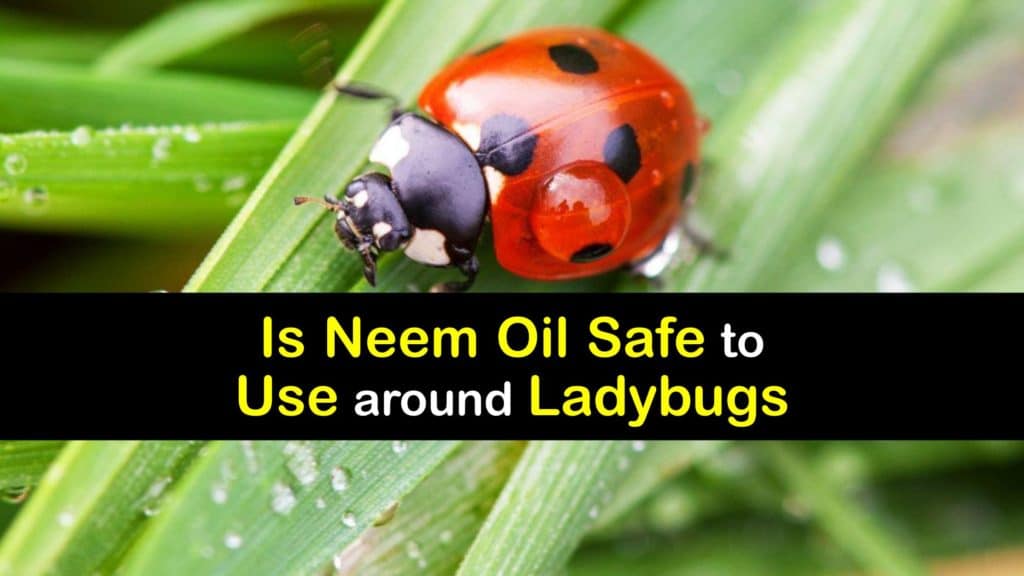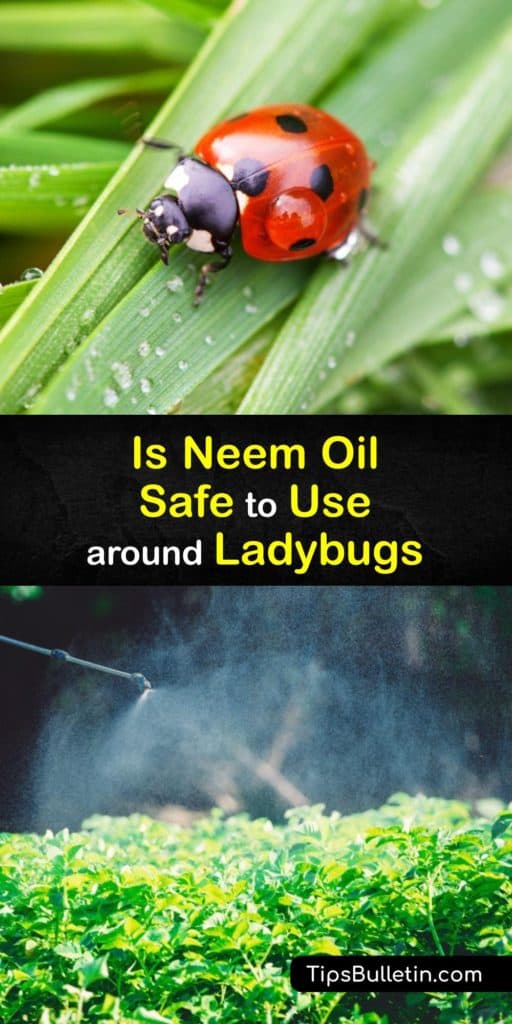Gone are the days when gardeners widely used chemical insecticides. The need for chemical-free organic gardening is spreading, and with it comes the rise of natural insecticides like neem oil. Although neem oil does not involve using harsh chemicals in the garden, is neem oil safe for ladybugs because of its known effect in killing insects?
Neem oil insecticide is effective against various garden pests like spider mites, fungus gnats, aphids, and worms. In addition to dealing with pests, neem oil works as a fungicide to deal with plant pathogens and fungal diseases like powdery mildew.
When we think about garden pests, we might only consider the bad ones, the insect pests that feed on plant sap and transmit diseases. However, there is another type of insect that frequents flower plants, and these are beneficial insects.

Is Neem Oil Toxic to Ladybugs?
We can’t overstate the importance of beneficial bugs like lady beetles, honey bees, and beneficial nematodes as they act as natural predators for harmful insects. Lady bugs help pollinate plants which leads to the production of fruit.
When using neem oil, or any horticultural oils, it’s vital to read the label to understand its usage for pest control. Many insecticide products state whether or not it is safe for humans and animals and whether they are toxic to plants and insects, but will neem oil kill ladybugs?
What Is Neem Oil?
Also known as margosa oil, neem oil is a vegetable oil pressed from seeds of the neem tree (Azadirachta indica). The oil’s host tree is native to India and South Asia and now grows in many tropical environments.

Neem oil contains Nimbin, a chemical compound credited for giving neem oil its antifungal and antiseptic properties. In its native area, neem oil has a history of use in folk medicine; however, studies show that neem oil may be toxic when ingested.
In horticulture, gardeners use neem oil to create neem oil sprays, insecticidal soaps, and soil drenches as pest control methods for harmful insects like Japanese beetles, caterpillars, and many others. Use neem oil to repel mosquitoes and get rid of aphids; neem oil is not toxic to dogs either so use it against fleas and ticks.
The National Pest Control Information fact sheet for neem oil states that it acts as a repellent for insects, hinders their ability to feed, and interferes with insect hormone systems... Because it has these effects on insects, is neem oil toxic to ladybugs?
Will Neem Oil Kill Ladybugs in the Garden?
Most garden insects have hard bodies, so spraying them with neem oil doesn’t directly affect them. What makes neem oil most effective against pests is when they consume it after its spread on a plant’s leaf.
This contact introduces neem oil into the system of target insects, allowing it to work. Once ingested, it affects an insect’s growth ability, stopping larvae from reaching the adult stage. Adult insects that consume neem oil may struggle to lay eggs, preventing them from creating the next generation of pests. It kills squash bugs, leaf-footed bugs, and others this way. Use neem oil to kill Japanese beetles and aphids on your plants.
As a soil drench, neem oil causes harmful nematodes to stop feeding on plant roots. The smell of neem oil, which is comparable to the essential oil inside garlic plants, also acts as a repellent for some insects.
If neem oil kills insects, is neem oil toxic to ladybugs? Technically yes, because of the effect on bugs, it isn’t safe for ladybugs. As a natural product, there isn’t any chemical engineering involved to make neem oil target and harm certain insects while being benign to others.
Gardeners continue to use neem oil despite any potential risk against beneficial insects because neem oil is only fatal against soft-bodied insects and against insects that consume it. Beneficial insects, like the Asian ladybug, don’t feed directly on plant leaves and are not at risk of being harmed by neem oil. Neem oil is not harmful to bees the same way. Bees target plant flowers rather than other parts of the plant.
Is Neem Oil Safe for Ladybugs?
Because of its consistency, neem oil does not leave behind a residue on plant leaves, and rainfall washes it away. To make neem oil effective, gardeners combine it with dish soap to help it stick to plant leaves, increasing the odds that an insect consumes it when feeding on the plant.
Neem oil kills pests like aphids that rely on plant sap for nutrition after ingesting the oil. It repels other pests through taste after feeding on the treated leaves; however, neither of these scenarios applies to ladybugs.
We wouldn’t say that neem oil is safe for ladybugs because it is harmful if neem oil products directly spray them. However, because ladybugs visit the flowers of plants and do not feed on leaves, it does not harm them through ingestion.
Water does not mix well with neem oil, so before creating your spray, combine water with liquid soap to reduce the surface tension. Pour neem oil into the sprayer, and once mixed, treat all foliage and stems of your plants.
When treating plants with neem oil, be mindful not to spray your plant’s flowers. Spraying plant foliage prevents beneficial insects from coming in contact with the main ingredient in neem oil, Azadirachtin.
Another way to avoid treating beneficial insects with neem oil is to spray early in the morning or at the end of the day when most beneficial insects are inactive.
In addition to helping with harmful bugs, neem oil works great for lawn fungus and powdery mildew on a variety of plants. Spray all parts of the plants to ensure effective coverage.
Other Uses for Neem Oil
Aside from directly spraying plants with a combination of neem oil and soap, neem oil is effective when poured around the soil of your plants as a drench. Applying neem oil allows a plant’s roots to absorb the oil and use it as a systemic insecticide. Control whiteflies with neem oil, as well as a host of other harmful bugs. Use the same measurements for a neem oil soak and making a foliar spray.
In a bucket, combine your water and mild liquid soap to create a mix that neem oil combines with easily. Slowly add your neem oil in and mix until well combined. From your mix, portion out two cups to pour around your plants. Treat your plants with a fresh neem oil soak every two weeks to keep pests away.
It’s also beneficial to use cold pressed neem oil for bed bugs along with other pest control methods to eradicate that unwelcome problem.
Add a few drops of neem oil to your dog or cat’s collar. Neem oil is safe for cats and dogs when used this way – it’s great for repelling fleas and ticks. It’s one of the easiest ways to use neem oil for ticks and keep them off your pets. Make a neem oil spray recipe for cats to eliminate a flea problem and add it to pet bedding for repellent purposes.
If you’re new to organic gardening and want to ensure your efforts to protect your plants don’t have any adverse effect on the wildlife, neem oil is not toxic to birds or beneficial insects that visit your garden.
Neem oil is the perfect tool to keep insects from destroying your plants without harming natural predators and pollinators through proper application and handling.

We hope our guide answered your question, “Is neem oil safe for ladybugs,” and you’ll share our advice on Facebook and Pinterest with fellow gardeners wondering, “Will neem oil kill ladybugs?”